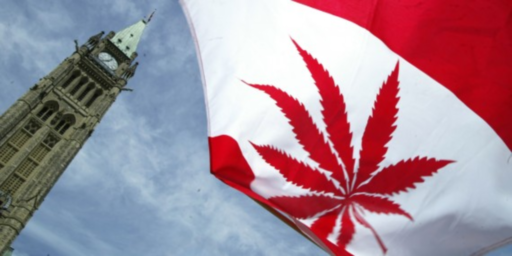Still The Least Dangerous Branch
Anna Quindlen argues that Supreme Court appointments are the most important choices presidents make.
Congress chips away at legislation, then sends some lowest-common-denominator version to the White House, to be signed or vetoed or later redesigned by the next president to take up temporary residence in Washington. But the work of the high court has had vast systemic influence over the lives of all Americans, an effect that lasts through generations. In the tripartite tussle, it’s no contest: SCOTUS rules.
The display of the Ten Commandments in public buildings. The scope of eminent domain. The reading of rights to defendants. The ability of taxpayers to litigate against faith-based government-funded programs. School prayer. Medical marijuana. Campaign ads. And that’s before you get to desegregation, abortion, affirmative action and capital punishment. If you try to register to vote in Indiana and are turned away because you don’t have a government-issued photo ID, that’s because the Supremes just ruled, 6-3, that that’s OK.
This is sheer and utter nonsense. In each and every one of these examples, the Supreme Court was merely reacting to public policy decisions made by executives and legislators.
Public officials decided to put up the 10 Commandments where, in some cases, they remained up for decades. Only when someone took a case to court did SCOTUS rule this was impermissible. Public officials decided to push the envelope on eminent domain and SCOTUS ruled that, indeed, they could.
Who put in those faith-based programs? Keeps pushing for novel ways to have public prayer? Test the limits of previous abortion rulings? Passes laws on marijuana? In all cases, it’s decision makers. The courts come in after the fact — and only after someone brings suit — to weigh in on the rules. That’s a tertiary role, not a leading one.
The Indiana voter ID law is a perfect example of how journalists continually misrepresent the court’s role. Hoosiers don’t have to show ID “because the Supremes just ruled, 6-3, that that’s OK.” They have to do it because the state legislature mandated that they do so and the governor signed off on it.
There’s no denying that the Supreme Court plays a major role in shaping public policy. They’ve weighed in on some of the most divisive issues in our history and have changed the culture in a handful of instances by striking down age-old practices. But, frankly, nobody’s disputing that.
While the Court, thanks to a shrewdly executed power grab by John Marshall in 1803, is more powerful than Alexander Hamilton intended when he described the judiciary as “the least dangerous branch,” so, too are the other branches. And the state and local governments. And the never-envisioned bureaucracy. The courts are so powerful precisely because we have so much government.
Still, the Supreme Court can’t send our troops off to war. They can’t raise your taxes. They can’t even pass laws. In the tripartite tussle, then, it’s no contest: SCOTUS is dead last.





It does strike me that the USSC has been the first line of offense for the left for the last 50 years or so. Quindlen is, therefore obviusly arguing from that leftist view of the courts’ import, I think, and so she decries the result of what happens when the court is no longer activist- leftist.
Absolutely. And when it comes to exercising power over our day-to-day lives, no federal governmental entity comes close to local government (state, city, town, village, whatever).
You might call this a corrollary to Tip O’Neill’s “All politics is local.” All real power over our daily lives is local. (Anyone who’s lived in a small town, especially a small New England town, knows what I’m talking about.)
Actually, they can under their equity powers or, more accurately, they can order the Congress to raise your taxes.
There’s another power that makes Congress supreme: the power to limit the appellate jurisdiction of the Supreme Court. The Court has primary jurisdiction over federal law, treaties, cases involving ambassadors, maritime, cases between states and between citizens of states other than their home states and between citizens of different states. What proportion of the total cases it hears does that constitute these days? Half? Ten percent?
If you consider it “sheer and utter nonsense” take a moment to consider what would have happened if they rules differently in each of the examples. Sure the issues are put before them by the executive or legislative branch but the direction is decided by the court.
Now I’m not saying they are the most powerful branch of government but they influence policy in ways the others cannot. Both the executive and legislative are not nearly as bound by previous decisions. There is no ‘stare decisis’ for them.
The President’s choices for the court may not be the most important decisions made but they are very near the top.
Right, but she’s making a much grander argument than that. Yup, they’re important. But, hell, everybody knows that. She’s saying they’re by far the most important. They ain’t.
One of my favorite quotes is by Thomas Sewell (although I definately don’t agree with him on many issues): “The most basic question is not what is right but who decides what is right?”. As the final arbiters of “what is right”, SCOTUS is the most powerful body. They are the citizens’ last defense against “well intentioned” politicians at all levels of government. Their decisions on cases heard (and on whether on not to even hear a case) is the difference between holding the final protective line for freedom or signing its death certificate. *in my opinion*
Ah. But they’re only the final arbiters because the Congress allows them to be. Act of Congress could eliminate the Court’s appellate jurisdiction, a significant part of its power. That the Congress elects not to exercise its power is a matter of practice, not of principle.
But they sure can get 40+million babies murderd ruling in the favor of a few idiot liberals against the will of the people.
And THAT, Mr. Phillips, goes back to my argument of a few months ago, (?) here, as regards the government (and in this case, I include the court) changing the culture, and over-riding the will of the people.
While I disagree with the ruling both as a matter of public policy and constitutional interpretation, it’s still merely the overturning of law. Abortion was legal until it was outlawed. And the court didn’t “get 40+million babies murderd,” they merely allowed private individual citizens the right to do it.
Mr. Shuler – I see your point. I guess the debate boils down to how one defines ‘power’; whether in terms of theory or practice. Very interesting topic!
Dr. Joyner: I associate myself with your remarks. Put another way: I think you nailed it.
This is sheer and utter nonsense.
It’s not nonsense; it’s just improperly focused. The SupCt doesn’t set policy but it does lay a good portion of the foundation upon which policy is made. Policy advances that were decades in the making can be undone in a very short time, altering the superstructure around which the next series of policy developments are developed.
The pro-lifers showed they’d finally learned this when they stopped trying the get Roe v. Wade overturned wholesale and started working on chipping away at abortion and building a body of helpful caselaw.
Another example is the rebirth of federalist limitations on federal power that began under Rhenquist. That could, if properly nurtured, form the basis of a generation-long paring back of extra-constitutional federal power. But my chief worry about this year’s Presidential race is that a couple/three more activist liberals in the mold of Ginsburg could undo it in half the time it took to set it in motion.
The court made the wishes of the few seem acceptable against the will of the majority, witch was made to seem like it never existed or mattered, so I’ll blame court as the branch most dangerous to a citizen getting a chance at a first breath let alone a vote. Now you can argue that what 40+ million vote them selves into as being more dangerous but can’t you see what 40+ million put to death without a chance and the fact that half this country now thinks it’s no big deal because of it to be a realists summation of cause and effect of the most harmful?
Did the SC interpret or did they create out of opportunity what they called emminations from penumbras or some other crap talk to create from thin air a right to privacy from the Constitution. That’s creating law. The power to interpret arbitrarily without fear of immpeachment is making law in my book.
“As the final arbiters… SCOTUS is the most powerful body.”
Well… sort of. But take, for example, Kelo – the Court itself noted that legislatures across the country could change things, and in fact begged them to do so. Final? Nope.
Nothing in the law is ever final. All I can ever get out of my attorney is an opinion.